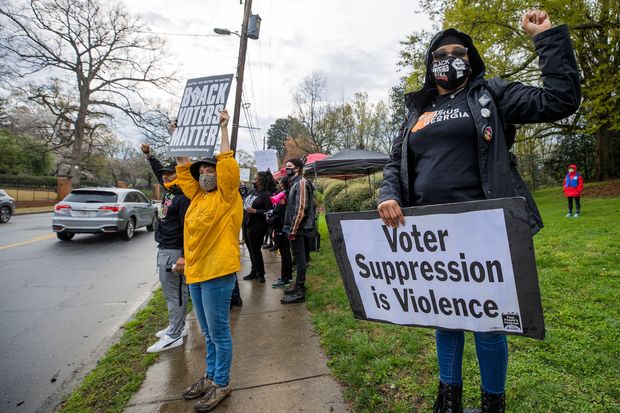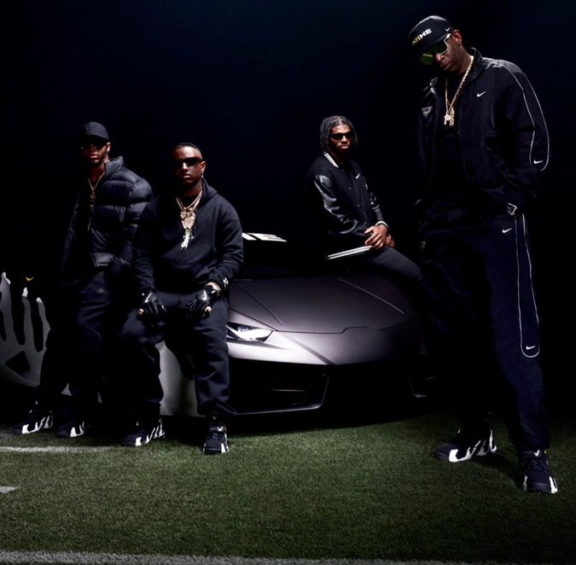
Will voting hours be restricted?
President Biden has said: “What I’m worried about is how un-American this whole initiative is. It’s sick. Deciding that you’re going to end voting at five o’clock when working people are just getting off work.”
But it’s not the case that voting has to finish at 5pm.
The law allows counties to set voting hours anywhere between 7am and 7pm, as was the case previously.
The new law does lay out the hours that are required as a minimum on election day, saying “voting shall be conducted beginning at 9:00 A.M. and ending at 5:00 P.M.”, as opposed to “during normal business hours” stated in the old law.
But “normal business hours” were widely interpreted as 9am to 5pm anyway, so the practical impact of this change is negligible.
Are people banned from giving water to voters?
There’s been criticism of a provision which bans some people from handing out food or water to voters within a certain distance of polling sites.
It’s true that the rules on this have been tightened.
Republicans say the move limits potential interference before people cast their ballots.
In previous elections, voting rights groups have often given out supplies to people standing in long lines at voting locations, which are a feature in US elections.
Long waits are more common in areas with a larger black population, often due to fewer polling stations and other barriers to voting.
But Republicans have pushed back on claims that the new law criminalises giving water to voters.
Although poll workers are still allowed to give away water, other people will have to follow certain restrictions under the new regulations.
Exclusive Photograph and Film

The law makes it an offence to give away food or water within 150 feet of a polling place or within 25 feet of any voter in line.
Violations can be punishable by up to a year in jail and a $1,000 fine.
What else is in the new law?
There are dozens of other provisions, but the tightening of some restrictions around postal ballots has attracted attention.
The new law says postal ballots can be sent out to voters who request them 29 days before election day, as opposed to 49 days previously.
And new voter ID requirements mean signature matching will no longer be used to confirm identities on postal ballots – a method railed against by Donald Trump.
Instead voters will have to provide one form of identification, such as a driver’s licence or social security number.
Proponents of the bill say this method will make postal voting more secure, but critics argue the new measures are likely to disproportionately affect black Americans, who are less likely than other voters to have the identification now required.


 The Force Awakens: Aiden Anderson’s Rise in Dallas Amateur Boxing
The Force Awakens: Aiden Anderson’s Rise in Dallas Amateur Boxing  Thomas Edward Patrick Brady Jr, Shedeur Sanders, Travis Hunter, Shilo Sanders, Jimmy Horn Jr, Global Don, and more
Thomas Edward Patrick Brady Jr, Shedeur Sanders, Travis Hunter, Shilo Sanders, Jimmy Horn Jr, Global Don, and more  Denver Public Schools has resolved to shut down seven schools, facing considerable opposition in the process.
Denver Public Schools has resolved to shut down seven schools, facing considerable opposition in the process.  The Real Spill Talk Show -Overwhelming Friends-
The Real Spill Talk Show -Overwhelming Friends-  SNACO
SNACO  Was it really about the Lil Wayne Concert
Was it really about the Lil Wayne Concert  Sofia Llamas: A Force for Good in Colorado – Igniting Hope and Empowering Communities
Sofia Llamas: A Force for Good in Colorado – Igniting Hope and Empowering Communities  Trump administration offers to pay plane tickets, give stipend to self-deporting immigrants
Trump administration offers to pay plane tickets, give stipend to self-deporting immigrants